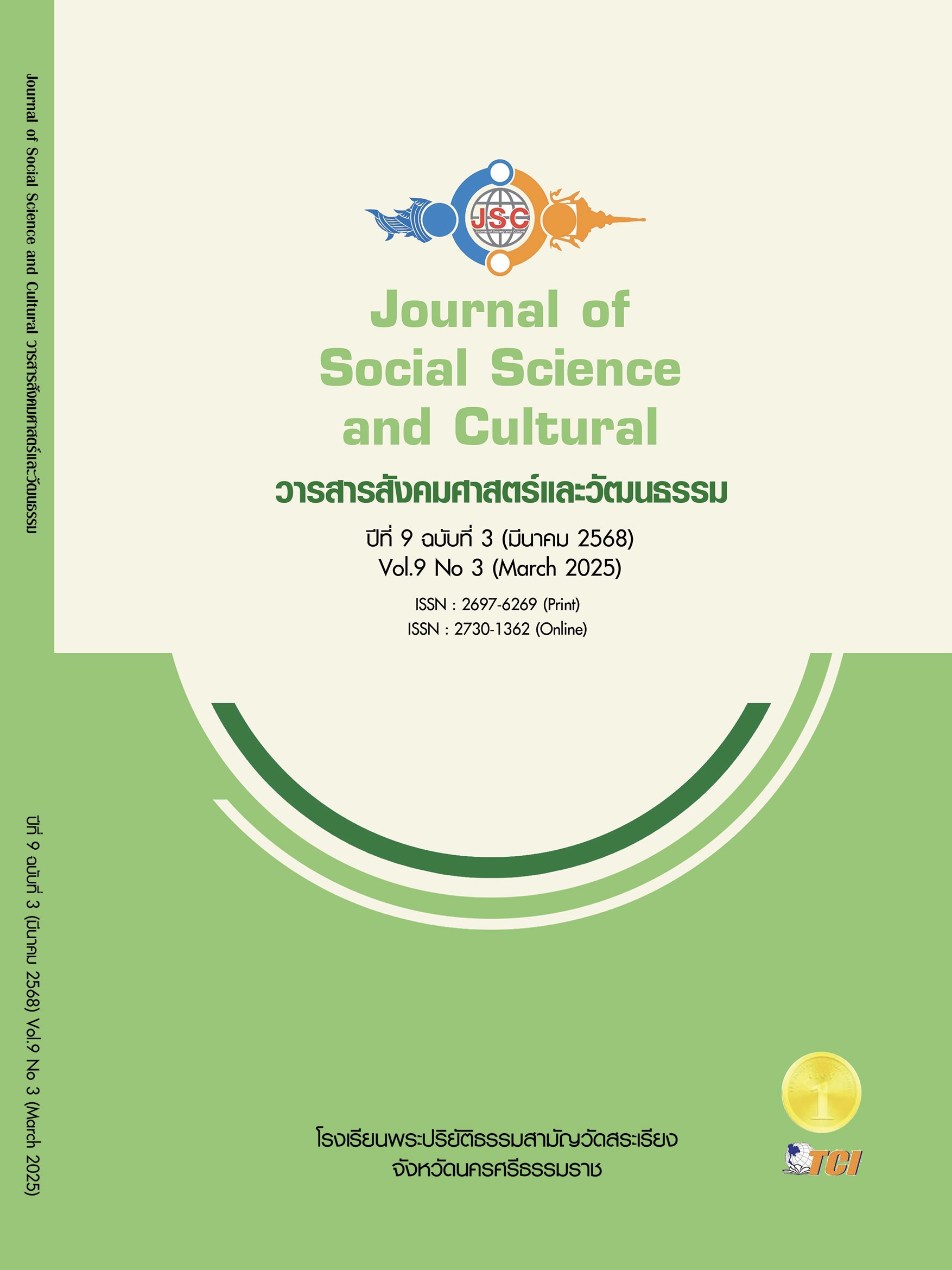GUIDELINES FOR DEVELOPING TOURISM MANAGEMENT THROUGH THE PARTICIPATION OF STAKEHOLDER NETWORKS: A CASE STUDY OF KHOK SUNG SUBDISTRICT, KHOK SUNG DISTRICT, SA KAEO PROVINCE
Main Article Content
Abstract
This research aims to: 1) Study the level of potential in tourism management; 2) Examine the influence of participatory tourism management by network stakeholders on tourism management potential; and 3) Propose ways to develop tourism management through stakeholder participation in the Khok Sung Subdistrict, Khok Sung District, Sa Kaeo Province. The study is a mixed-methods research. The sample group consists of residents in Khok Sung Subdistrict, Khok Sung District, Sa Kaeo Province. The sample was determined using Krejcie & Morgan's sample size formula, resulting in 357 participants. Key informants include government officials, business owners from the private sector, community leaders, and citizens, totaling 8 individuals. The research tools include a questionnaire and a semi-structured interview. Data was collected through the questionnaire and in-depth interviews. The statistical analysis used includes frequency, percentage, mean, standard deviation, and multiple regression analysis with prediction coefficients using the Enter method. The results of the study indicate that the tourism management potential is measured across 8 areas, with the overall average being at a high level. The influence of participatory tourism management by network stakeholders on tourism management potential has a positive effect, significantly increasing the tourism aspect at the 0.05 level. However, the official relationship structure has a negative influence, significantly decreasing the tourism aspect at the 0.05 level. The proposed development of tourism management through stakeholder participation consists of four areas: 1) Conditions for cooperation; 2) Structuring formal relationships; 3) Leadership roles in building cooperation; and 4) Tourism potential.
Article Details
References
กรมสนับสนุนบริการสุขภาพ. (2567). รายงาน 3 หมอรู้จักคุณ. เรียกใช้เมื่อ 10 สิงหาคม 2567 จาก https://3doctor.hss.moph.go.th/main/
การท่องเที่ยวแห่งประเทศไทย. (2565). สถานการณ์การเดินทางท่องเที่ยวโลก. TAT REVIEW, 8(2), 40-46.
คณะกรรมการนโยบายการท่องเที่ยวแห่งชาติ. (2566). แผนพัฒนาการท่องเที่ยวแห่งชาติฉบับที่ 3. เรียกใช้เมื่อ 18 สิงหาคม 2567 จาก https://drive.google.com/file/d/1eWJvZe1dHLKlABXB6PDJZXKVav4f-9hQ/view
นันทวัฒน์ ธานินทร์เดชานันท์ และคณะ. (2566). รูปแบบความร่วมมือในการให้บริการสาธารณะของกรมชลประทานในโครงการบริหารจัดการน้ำ. วารสารสังคมศาสตร์และวัฒนธรรม, 7(10), 238-249.
บุญเลิศ จิตตั้งวัฒนา. (2548). อุตสาหกรรมการท่องเที่ยว. (พิมพ์ครั้งที่ 1). นนทบุรี: บริษัท เพรส แอนด์ ดีไซน์ จำกัด.
พัชราภรณ์ จันทรฆาฎ และคณะ. (2566). การศึกษาทัศนคติและการมีส่วนร่วมในการพัฒนาการท่องเที่ยวเชิงวัฒนธรรม ตำบลโคกสูง อำเภอโคกสูง จังหวัดสระแก้ว. ใน รายงานการวิจัย. มหาวิทยาลัยราชภัฏวไลยอลงกรณ์ ในพระบรมราชูปถัมภ์.
พิมพ์พรรณ อำพันธ์ทอง และคณะ. (2566). ศักยภาพของผู้สูงอายุในการพัฒนาแหล่งท่องเที่ยวในชุมชนบ่อสุพรรณ อำเภอสองพี่น้อง จังหวัดสุพรรณบุรี. วารสารสังคมศาสตร์และวัฒนธรรม, 7(8), 35-44.
พิมพิกา นวนจา และคณะ. (2563). ภาคีเครือข่ายการจัดการท่องเที่ยวของหมู่บ้านแม่กำปอง ตำบลห้วยแก้ว อำเภอแม่ออน จังหวัดเชียงใหม่. วารสารรัฐศาสตร์และรัฐประศาสนศาสตร์, 11(2), 29-54.
วสันต์ เหลืองประภัสร์. (2557). โครงการ “การสังเคราะห์ตัวแบบเชิงทฤษฎีและการบริหารจากผลการดำเนิน โครงการวิจัยเพื่อพัฒนากลไกความรวมมือเพื่อแก้ปัญหารร่วมกัน ของคนในพื้นที่”. ใน รายงานการวิจัย. สำนักงานกองทุนสนับสนุนการวิจัย.
Cronbach, L. J. (1971). Essentials of psychological testing. New York: Harper & Row.
Krejcie, R. V. & Morgan, D. W. (1977). Determining Sample Size for Research Activities. Educational and Psychological Measurement, 30(3), 607-610.
Rovinelli, R. J. & Hambleton, R. K. (1977). On the use of content specialists in the assessment of criterion-referenced test item validity. Tijdschrift voor Onderwijsresearch, 2(2), 49-60.


